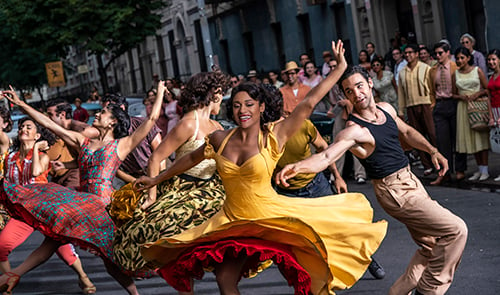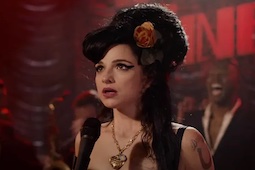
On the eve of the release of West Side Story, the entertainment world is reeling from the death of Stephen Sondheim. The famed lyricist and composer originated West Side Story on Broadway, setting in motion a new era of socially-conscious, lyrically inventive and uproariously entertaining productions.
The scale of Sondheim's achievements is too vast to sum up here. Instead, we've decided to focus on the many movie adaptations of his work, each of which helped to cement his reputation as a one-of-a-kind artist. If you're gearing up to watch Steven Spielberg's visually dazzling new adaptation of West Side Story, this is the perfect place to start.
1. West Side Story (1961)
Sondheim collaborated with the esteemed composer Leonard Bernstein (On the Waterfront) to bring West Side Story to Broadway in 1957. The result was an immediate sensation, and Sondheim and Bernstein joined forces again for the ensuing film adaptation in 1961, directed by Robert Wise and Jerome Robbins. As both a play and a film, West Side Story smashed several boundaries, blurring the nominal divides between opera and musical theatre to create an outsized, highly emotional experience, the likes of which had rarely been seen before.
West Side Story was also groundbreaking in terms of how it depicted its subject matter. Racism, xenophobia and gang violence were treated in ways that were considered alarming for the time, helping audiences to fully invest in the star-crossed romance between Tony and Maria. The former is a member of the New York gang the Jets but has fallen for the latter, who is the sister of Bernardo, the leader of rival gang, the Sharks. Sondheim's quick-witted lyricism fused with Bernstein's understanding of various rhythmic idioms (namely those of Puerto Rico, the Sharks' home country) to paint a complex cultural portrait through music.
West Side Story's ability to traverse both high-brow art forms and mass-market commercialism, all laced with a dash of Shakespeare's Romeo and Juliet, saw it awarded with 10 Oscars out of 11 nominations, and it remains the record-holder in terms of Oscar wins for a musical. The movie triumphed in the Best Scoring of a Musical Picture category, which was awarded to Saul Chaplin, Johnny Green, Irwin Kostal and Sid Ramin. Ironically, Bernstein disparaged the film's orchestral treatment of the play's musical numbers, describing it as "overbearing". Further rubbing salt in the wound was the lack of a single Oscar nomination for Best Original Song (presumably because each number had its origins in a different medium). Even so, Sondheim and Bernstein's impact on the development of the movie musical is hard to measure – everything from the characterisation to the musical metres and the gritty urban setting proved hugely influential.
2. Gypsy (1962)
Sondheim helped originate the stage musical Gypsy: A Musical Fable in 1959, working alongside story writer Arthur Laurents and composer Jule Styne. The play was, itself, an adaptation of the memoir of Gypsy Rose Lee, a noted burlesque performer. The original production was a somewhat unflattering, uncompromising look at the perils of fame, focusing on a young mother who is determined to get her two daughters into show business. Regarded as one of the finest American musicals, it introduced several musical staples that have subsequently become standards including 'Everything's Coming Up Roses'.
For the 1962 movie adaptation, Sondheim again collaborated with Jule Styne while Hollywood legends Rosalind Russell and Natalie Wood took on the pivotal roles of Rose and Louise Hovick. That said, the role of Rose proved too much for Russell's musical talents and she was over-dubbed by contralto Lisa Kirk. The movie was helmed by Mervyn LeRoy, himself no stranger to movie musicals: he had transformed 1939's The Wizard of Oz into one of the most dazzling, enchanting cinematic spectacles of all time. Gypsy proved to be a box office success and was nominated for three Oscars.
3. A Funny Thing Happened on the Way to the Forum (1966)
Sondheim acted as both lyricist and composer for this Roman farce, which originated on the stage in 1962. The Tony-winning production focused on a hapless slave named Pseudolus, and his attempts to win his freedom by helping his master seduce a beautiful woman. Multiple Broadway revivals followed, not to mention several international productions, and when it came to the movie adaptation, original Pseudolus actor Zero Mostel was carried over.
Intriguingly, the movie showcases the final performance from legendary silent movie clown Buster Keaton. It was also an early movie for cinematographer Nicolas Roeg, later to become a director of repute via the likes of Don't Look Now (1973). As for Sondheim, several of his original Broadway numbers were cut from the movie for pacing reasons. His original score was adapted by British composer Ken Thorne who had collaborated with The Beatles on Help! (1965). Thorne grabbed Forum's sole Oscar for Best Music, Scoring of Music, Adaptation or Treatment.
4. Sweeney Todd: The Demon Barber of Fleet Street (2007)
Of all the movie adaptations of his work, Sondheim valued Sweeney Todd the best. He admired director Tim Burton's ability to condense the formidably complex and grisly stage production, which focuses on the murderous barber Sweeney Todd and his partner-in-crime, pie-maker Mrs. Lovett. Sondheim sought to adapt the legacy of 'penny dreadfuls', exploitative and morbid tales of horror that were popular in Victorian-era London. Angela Lansbury and Len Cariou originated the principal roles on the stage in 1979 and were a giddy, morbidly amusing delight, and there was surely no hope for any cinema actor to top their impact.
Recognising this, Burton scaled down the outsized parameters of the musical, and instead amped up the psychological horror of Todd's madness. To that end, he was aided and abetted by superb performances from Johnny Depp and Helena Bonham Carter, both pale of face and ruthless of intent. Although neither Depp nor Bonham Carter is operatically trained, they make up in delivery what they lack in experience, delivering forceful, carefully phrased pitching that is firmly in line with Burton's gloomy, grimy study of 19th century London. Their vocals mesh beautifully with the thunderous nature of Sondheim's original stage compositions, boosted by orchestrator Jonathan Tunick (who worked on the stage production) from 27 musicians to 78.
5. Into the Woods (2014)
Sondheim's ability to adapt to various idioms and genres was truly remarkable. His darkly alluring Into the Woods, a collaboration with writer James Lapine, is both a subversion and celebration of classic fairy tale tropes, and debuted on Broadway in 1987. The production takes as its basis the classic tales of the Brothers Grimm (Little Red Riding Hood et al), bookended by the story of a baker and his wife who are seeking to have a child. When they subsequently come across a witch, she curses them, which sets the narrative in motion.
The 2014 Disney adaptation, perhaps unsurprisingly, sands down the less-than-savoury elements of Sondheim's work, aiming to make it more appealing to a broad family audience. (That said, Johnny Depp puts in a suitably creepy, off-putting performance as the Wolf.) Director Rob Marshall, a veteran of musical adaptations following Chicago and Nine, marshalls proceedings and works with an all-star cast, the stand-outs being Emily Blunt as the Baker's Wife and Meryl Streep as the Witch.
AND COMING VERY SOON...
7. West Side Story (released 10th December 2021)
Director Steven Spielberg makes his first venture into musicals with his remake of West Side Story. (One could contest that the 'Anything Goes' opening of 1984's Indiana Jones and the Temple of Doom is a mini-musical in and of itself.) Spielberg works with screenwriter Tony Kushner (Munich; Lincoln) to adapt the formidable legacy of Sondheim and Leonard Bernstein, with composer David Newman (Matilda) arranging the score and Gustavo Dudamel (Star Wars: The Force Awakens) conducting.
Prior to his death, Sondheim had been talking with Kushner about a fresh adaptation of his work. At the movie's world premiere in New York, Kushner told Variety: "For years, [Sondheim] and I argued about the musical. He was always a little down on it. He always felt the lyrics weren’t his best, and I violently disagreed." Eventually, Sondheim gave his blessing, allowing a new iteration of West Side Story to take shape.
Spielberg addressed the live audience at the premiere, saying: "This can’t be the night we’ve long anticipated, because of the absence of Stephen Sondheim. His amazing lyrics for West Side Story first put him on the map and launched a career that would completely redraw that map, reinvent the musical and theater, and create a body of work that beyond any doubt is as immortal as anything made by a mortal could be.
“Like everyone else on the planet who cares about words and music, I’m heartbroken at this sudden loss. But Steve is here with us tonight, in the form of his great, abiding genius in the glorious musical he helped to bring into the world 64 years ago, and he’s also here in our gratitude for all the art and culture he left behind."
The movie's cast is an intriguing cross-section of generational talent. Baby Driver's Ansel Elgort is Tony and Rachel Zegler is Maria; the latter first established her presence on YouTube and beat out thousands of other applicants to win the pivotal role. The star of the original film, Rita Moreno, also appears as Valentina. Critics have so far been effusive in Spielberg's treatment of Sondheim's original property (click here to discover the early reactions), praising both the look of the film and Zegler's exuberant, full-blooded performance.
Click here to book your tickets for West Side Story, which opens on 15th December in Cineworld cinemas nationwide.














.jpg)
.png)



